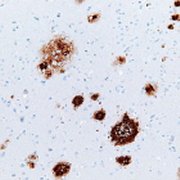I founded Alzheimer Solutions in 1998, after earning a graduate certificate in gerontology and a certificate in laboratory biotechnology.
It has been my hope to provide information and resources for alzheimer patients and their families. Another interest of mine
is to learn and understand all the latest findings about the biochemistry of the disease. I have been working, and will continue
to work,to find substances that can alter the course of alzheimer's disease, perhaps even reverse it.
My current belief is that alzheimer's disease is due to a defect in the mitochondria, the part of cells which produce usable energy for the cell.
Something causes the mitochondria to work extra hard, depleting energy production. Amyloid may be the substance that starts the mitochondria overproducing energy initially.
This sequence of events could create what is called a "hypermetabolic" state. The body and brain metabolism run high and patients may begin to lose weight.
In many patients, and especially in my father who died from alzheimer's disease, early, unexplained weight loss precedes memory loss and plaque developement.
It is interesting that many types of mice also develop alzheimer's disease, and in several strains of alzheimer mouse models,
the animals lose weight before they lose memory or develop amyloid plaques in the brain. This may explain why medium chain fatty acids, such as those found in coconut oil, may benefit alzheimer patients.
The alzheimer brain can still break down fats for energy, but cannot break down sugars.
Future alzheimer's disease medicines may end up being multiple drug cocktails that promote insulin regulation in the brain , supply fatty acids for easily burned fuel and also lower amyloid levels.
I will keep you informed of what's going on in the world of alzheimer's disease research...Just click on " RESEARCH" to see the latest findings. Thank you for
visiting my site.
Sincerely,
Jim W. Knittweis
